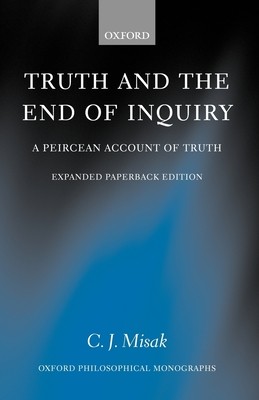
- We will send in 10–14 business days.
- Author: C J Misak
- Publisher: Clarendon Press
- ISBN-10: 0199270597
- ISBN-13: 9780199270590
- Format: 13.7 x 21.7 x 1.3 cm, softcover
- Language: English
- SAVE -10% with code: EXTRA
Reviews
Description
C.S. Peirce, the founder of pragmatism, argued that truth is what we would agree upon, were inquiry to be pursued as far as it could fruitfully go. In this book, Misak argues for and elucidates the pragmatic account of truth, paying attention both to Peirce's texts and to the requirements of a suitable account of truth. An important argument of the book is that we must be sensitive to the difference between offering a definition of truth and engaging in a distinctively pragmatic project. The pragmatic project spells out the relationship between truth and inquiry; it articulates the consequences of a statement's being true. The existence of a distinct pragmatic enterprise has implications for the status of the pragmatic account of truth and for the way in which philosophy should be conducted.
EXTRA 10 % discount with code: EXTRA
The promotion ends in 19d.19:40:02
The discount code is valid when purchasing from 10 €. Discounts do not stack.
- Author: C J Misak
- Publisher: Clarendon Press
- ISBN-10: 0199270597
- ISBN-13: 9780199270590
- Format: 13.7 x 21.7 x 1.3 cm, softcover
- Language: English English
C.S. Peirce, the founder of pragmatism, argued that truth is what we would agree upon, were inquiry to be pursued as far as it could fruitfully go. In this book, Misak argues for and elucidates the pragmatic account of truth, paying attention both to Peirce's texts and to the requirements of a suitable account of truth. An important argument of the book is that we must be sensitive to the difference between offering a definition of truth and engaging in a distinctively pragmatic project. The pragmatic project spells out the relationship between truth and inquiry; it articulates the consequences of a statement's being true. The existence of a distinct pragmatic enterprise has implications for the status of the pragmatic account of truth and for the way in which philosophy should be conducted.


Reviews